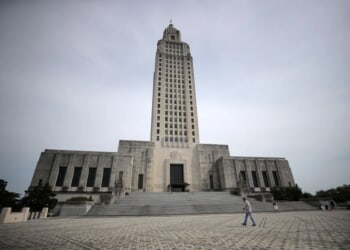Laura Weldon was the Conservative candidate for Pontefract, Castleford and Knottingley in the General Election and is the Deputy Chairman of the Five Towns and Hemsworth Federation of Conservative Associations.
Is there anything that brings a community together more than talking about bins?
I’m convinced that it’s a more fundamentally British topic for small talk than even the weather. People are obsessed with their bins. Go to any hardware shop in the country and you’ll find a little stand full of garish stickers to personalise your bin. Giant fluorescent numbers, floral decals, and even now, well after covid, you can still buy twee rainbow stickers for your bin that say “Thank You Key Workers”. There was even a story in the papers a few years ago of a woman who had given her wheelie bin a full-length vinyl wrap of EastEnders star and erstwhile washing powder salesman Shane Richie. That’s dedication, I’m sure you’ll agree. Both to the bin and to Mr Richie.
We’ve even coined a term – “binfluencer” – for the people on your street with a preternatural knowledge of what colour bin is going out on bin day. And there’s always that one chap who sees it as his Dunkirk-esque civic duty to put everyone’s bin back on their drive the moment the bin lorry has departed.
It’s our national bin-mania that has caught the public’s interest when it comes to the Birmingham bin crisis. While it may be the case that over-zealous application of equal pay legislation has caused it, bins live in the public consciousness as a totem of political failure, and other local authorities should take heed.
A few years ago I worked for one of the UK’s largest reusable nappy brands, and so I spent a lot of time thinking about bins, given that nappies account for about three per cent of household waste. Under the last Conservative Government, DEFRA (to their credit) did actually put some real effort and thought into what we do with over 25 million tons of waste that households alone create per year in the UK, but the localised nature of waste management has created a wicked problem that simultaneously requires and resists blanket solutions from central government.
We’re a tiny island, and we can’t support endless landfill, so the key question when it comes to waste is “what should we do with it?”.
Recycling is the answer that most people reach for, but as Boris Johnson once quite correctly identified, we can’t recycle our way out of the problem of waste. Only a few materials can be usefully recycled indefinitely (metals and glass, for example), but for other items – especially plastic – quality degrades with every cycle. And just because you can recycle a material, that doesn’t necessarily mean there’s a market for the end product (and therefore a financial incentive to pay to recycle it). Frequently, there isn’t, and recycling pilot projects shutter quietly and are never spoken of again.
But even if recycling would solve all our problems, we seem to be not very good at it, and only recycle around 44 per cent of our waste. The Germans, in comparison, recycle around 70 per cent.
One of the more popular National Bin Conversation Topics is the lack of standardisation of bin colours. People do love a whinge about why one town’s bin is blue and another’s is pink, but the deeper truth is that a national standardisation would in some cases mean that highly efficient automated sorting – in which some councils or their contracting partners have made significant investments – would have to be ditched (was going to write “binned” there but thought better of it…) in favour of manual sorting by homeowners, who in many cases contaminate their recycling on a regular basis. The Local Government Association estimates that the rate of contamination is about six per cent nationally, while the London Waste and Recycling Board give the average for London boroughs as 15 per cent, with some as high as 40 per cent, causing even higher processing costs for each contaminated load.
An increasing number of councils have partnered with Energy From Waste companies, who will incinerate non-recyclable rubbish. Sometimes this powers local heat networks, sometimes it’s a power station which now burns your refuse instead of coal or gas. Thanks to some complicated environmental maths and a fair bit of mental gymnastics this is classed as “green” energy, and to many councils it seems like a win-win. They provide a feedstock that otherwise they would have to manage, and in return they get green street cred and a financial incentive – in some cases just a lower overall cost than would be the case with landfill or recycling, in others there’s a net financial benefit to the council.
The problem with this system though is the moral hazard of there being virtually no upside for councils to reduce overall quantities of waste produced in their area.
Birmingham Council may well have fallen into a trap of short-term thinking that relies on regular and reliable bin collections to prevent giant mutant rats, stinking streets and Winter of Discontent visuals, but reducing and better managing overall levels of household rubbish would not only reduce costs of ongoing waste management but also reduce many of the public health and environmental risks associated with bins and their contents.
Councils rarely have the capacity to make radical unilateral changes to their waste strategy, so DEFRA must show national leadership on this deeply unglamorous area of policy. Rather than focusing on central government mandates on bin colours or collection frequencies however, the goal should be to reduce the overall volume requiring regular collection.
Offering guidance on how to implement “pay as you throw” systems, supporting councils in exiting contracts where they are penalised for producing insufficient quantities of feedstocks or cutting red tape for social enterprises which save items from the tip or the incinerator are all options that avoid more taxes, levies or bans.
Perhaps the fact that this rubbish is currently staring us in the face will concentrate minds on the issue. Let’s hope that the political will isn’t eventually swept away along with the piled up bin bags on the streets of Birmingham.


![NYC Tourist Helicopter Falls into Hudson River, Siemens Executive and Family Among Those Killed [WATCH]](https://www.right2024.com/wp-content/uploads/2025/04/NYC-Tourist-Helicopter-Falls-into-Hudson-River-Siemens-Executive-and-350x250.jpg)






![Green Day’s Cringe Trump Diss Ends in Fire and Evacuation [WATCH]](https://www.right2024.com/wp-content/uploads/2025/04/Green-Days-Cringe-Trump-Diss-Ends-in-Fire-and-Evacuation-350x250.jpg)
![Red Sox Fan Makes the ‘Catch of the Day’ with Unconventional ‘Glove’ [WATCH]](https://www.right2024.com/wp-content/uploads/2025/04/Red-Sox-Fan-Makes-the-‘Catch-of-the-Day-with-350x250.jpg)
![Bikini Clad Spring Breakers Prove Our Education System is Failing Students [WATCH]](https://www.right2024.com/wp-content/uploads/2025/03/Bikini-Clad-Spring-Breakers-Prove-Our-Education-System-is-Failing-350x250.jpg)





